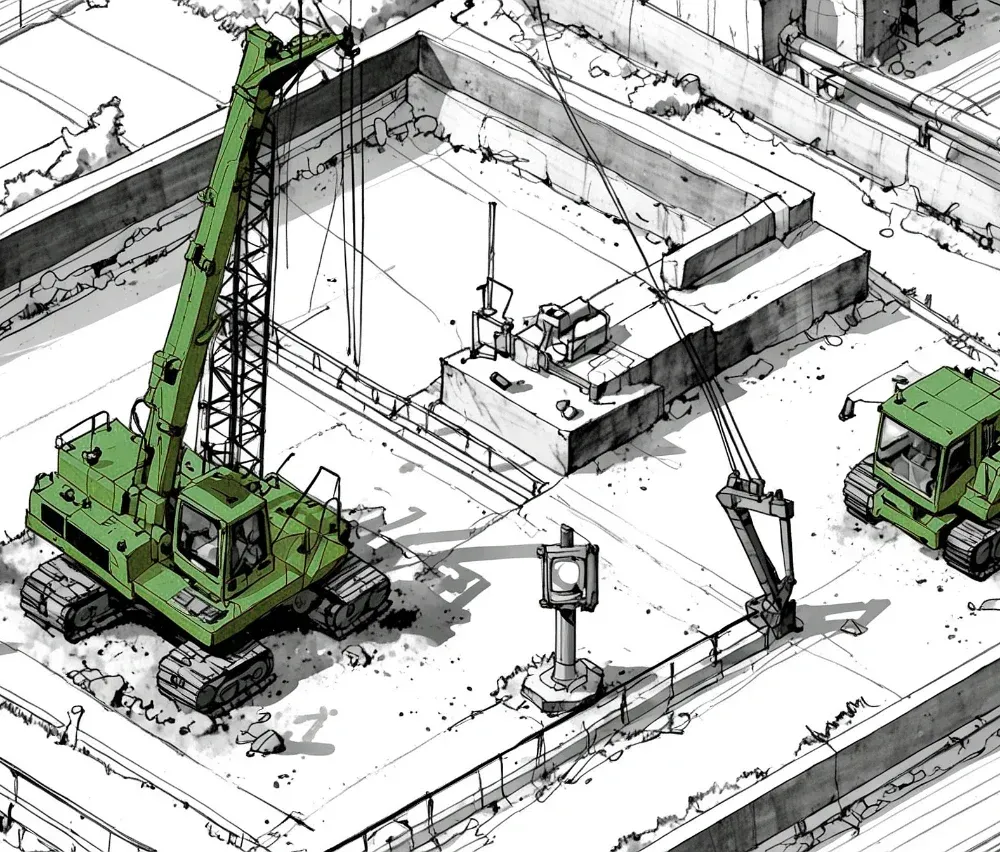Article
Remediation Contractor UK
Why Choose a Specialist Remediation Contractor for Your UK Land Development Project?
The appropriate management and remediation of contaminated land is crucial for successful development projects. Specialist remediation contractors often handle the remediation of brownfield sites, offering comprehensive solutions across various sectors, including chemical, pharmaceutical, oil and gas, and infrastructure. While some organisations might consider handling soil remediation in-house or through general contractors, engaging a specialist remediation contractor can provide significant advantages. Here’s a comprehensive look at why specialist expertise matters and how it can benefit your project.
Understanding the Complexity of Land Remediation
Land remediation in the UK involves navigating intricate regulatory requirements, employing sophisticated testing methods, and implementing effective treatment solutions. Contaminated land can present various challenges:
- Multiple contaminant types in contaminated soils requiring different treatment approaches
- Complex soil structures affecting contamination spread
- Varying regulatory requirements based on land use and location
- Strict environmental protection standards
- Time-sensitive project deadlines
The Regulatory Framework for Environmental Compliance
UK land remediation is governed by stringent regulations, including:
- Environmental Protection Act 1990
- Contaminated Land Regulations 2006
- Environmental Permitting Regulations
- Construction Design and Management (CDM) Regulations 2015
Specialist contractors maintain up-to-date knowledge of these regulations and their practical implications for your project. Obtaining regulatory approvals is essential for effective project management, ensuring compliance with relevant regulations.

Understanding Remediation Contractors
A remediation contractor is a specialist company that designs and implements strategies to clean up and restore contaminated land or sites. These contractors have extensive experience in delivering remediation projects and have a reputation for delivering projects on-time, within budget, and to impeccable health and safety standards. Remediation contractors have in-house technical specialists and operational managers who can manage all aspects of enabling works. They work with a wide range of clients, including commercial and residential developers, manufacturing and industrial operators, main contractors, consulting engineers, regulatory bodies, and the public and regeneration sectors.
Key Benefits of Using a Specialist Remediation Contractor
1. Expert Knowledge and Experience
Specialist contractors bring:
- Deep understanding of contamination types and behaviour
- Experience with various remediation techniques
- Knowledge of best practices and industry standards
- Familiarity with common challenges and solutions
- Regular training and professional development
- Insights from civil engineers in providing engineered solutions
2. Advanced Technology and Equipment
Specialist contractors invest in:
- State-of-the-art testing equipment
- Modern remediation technologies
- Specialised treatment systems
- Mobile laboratories for on-site analysis
- Advanced safety equipment
3. Cost-Effectiveness
While specialist services might seem more expensive initially, they often prove more cost-effective through:
- Accurate initial assessment reducing unexpected costs
- Efficient project completion reducing time-related expenses
- Appropriate technology selection optimising treatment costs
- Waste minimisation through selective treatment
- Prevention of future environmental liabilities
4. Risk Management
Specialists excel at:
- Comprehensive risk assessment
- Development of targeted remediation strategies
- Implementation of appropriate safety measures
- Management of environmental risks
- Protection against future liabilities
5. Regulatory Compliance
Specialist contractors ensure:
- Full compliance with current regulations
- Proper documentation and record-keeping
- Regular communication with regulatory bodies
- Updated permits and certifications
- Adherence to industry standards
- Training and strict adherence to protocols to ensure compliance with health and safety policies and legal regulations
6. Time Efficiency
Projects benefit from:
- Rapid mobilisation of resources
- Efficient project planning and execution
- Quick response to unexpected issues
- Reduced delays through expertise
- Streamlined processes and procedures
Remediation Process and Technology
The remediation process begins with a comprehensive site assessment, which evaluates historical land use, contamination types, concentrations, receptors, and proposed end-use. This assessment allows remediation contractors to develop a tailored remediation strategy that is optimised for efficiency, cost-effectiveness, and environmental compliance. Remediation contractors use state-of-the-art equipment and technologies to carry out the remediation, including in-situ and ex-situ treatment methods. They also utilise innovative solutions and best practices to mitigate environmental impacts and promote sustainable practices.
Remediation Methods and Strategies
Remediation contractors use a range of methods and strategies to clean up contaminated land, including bioremediation, stabilisation, soil washing, thermal desorption, and engineered solutions. Bioremediation is a natural process that uses biological methods to clean up contaminated soil, while stabilization involves tying up contamination to remove the risk of contamination. Soil washing is a method that separates contaminants from non-contaminated soil, and thermal desorption uses heat to remove contaminants from soil. Engineered solutions involve using engineering techniques to clean up contaminated soil, including the use of pumps, pipes, and other equipment.
The Sustainable Advantage
Specialist remediation contractors often lead in sustainable practices:
Environmental Benefits
- Minimised waste to landfill
- Reduced carbon footprint
- Protection of biodiversity
- Conservation of natural resources
- Sustainable remediation techniques
- Reducing soil contaminants to safe levels to protect human health
Economic Benefits
- Reduced long-term costs
- Enhanced property value
- Lower insurance premiums
- Improved development potential
- Reduced future liabilities

Health, Safety, and Environmental Sustainability
Remediation contractors have a robust health and safety management system in place, which is based on the principles of risk assessment, hazard identification, and continuous improvement. All employees undergo regular health and safety training, and specialised training is provided for those working on high-risk activities. Remediation contractors also prioritise environmental sustainability and strive to minimise their environmental impact. They use sustainable technologies and materials, and select remediation methods that have a lower carbon footprint. Remediation contractors also have a strong focus on waste minimisation and recycling, and seek to reuse and recycle materials generated during the remediation process.
Making the Right Choice
When selecting a specialist contractor for your remediation projects, consider:
Qualifications and Accreditations
- UKAS accreditation
- Professional body memberships
- Industry certifications
- Safety credentials
- Environmental management systems
Track Record
- Previous project experience
- Client testimonials
- Case studies
- Success rates
- Problem-solving abilities
Technical Capabilities
- Range of services offered
- Equipment availability
- Laboratory facilities
- Technical expertise
- Innovation in methods
- In situ treatment
The Impact on Project Success
Choosing a specialist remediation contractor can significantly influence project outcomes:
Project Management
- Clear communication channels
- Regular progress updates
- Milestone tracking
- Quality control measures
- Risk management protocols
Documentation and Reporting
- Comprehensive site investigations
- Detailed remediation strategies
- Regular progress reports
- Compliance documentation
- Completion certificates
Comprehensive Benefits of Professional Contaminated Soil Remediation: Timeline Analysis
Immediate/Short-Term Benefits (0-12 months)
Financial Benefits
- Reduced initial investigation costs through precise contamination mapping
- Lower waste disposal costs via targeted treatment approaches
- Minimised project delays through efficient remediation
- Optimised resource allocation based on accurate assessment
- Immediate compliance with regulatory requirements
Operational Benefits
- Rapid site access for development
- Clear timeline for project completion
- Minimised disruption to neighbouring properties
- Real-time monitoring and adjustment of remediation strategies
- Immediate risk reduction for site workers
Technical Benefits
- Accurate contamination assessment of contaminated soils
- Targeted treatment protocols
- Rapid validation of results
- Clear documentation trail
- Efficient waste classification
Long-Term Benefits (5+ years)
Financial Benefits
- Sustained property value appreciation
- Reduced long-term maintenance costs
- Enhanced development potential
- Lower environmental liability insurance
- Increased investment attractiveness
Environmental Legacy
- Creation of sustainable land assets
- Long-term ecosystem improvement
- Contribution to circular economy
- Reduced environmental footprint
- Enhanced natural resource protection
Business Reputation
- Strengthened environmental credentials
- Enhanced corporate social responsibility
- Improved stakeholder confidence
- Positive community relations
- Industry leadership position
Conclusion
Investing in a specialist remediation contractor is more than a regulatory requirement—it’s a strategic decision that can significantly impact project success. The combination of expertise, technology, and experience ensures that contaminated land is handled safely, efficiently, and in compliance with all relevant regulations.
The benefits of choosing a specialist contractor extend from immediate project success to long-term site sustainability and value. While the initial investment might be higher than non-specialist alternatives, the overall return in terms of project efficiency, risk management, and future site value makes it a sound business decision.
For any organisation facing land remediation challenges in the UK, partnering with a specialist contractor provides the expertise, technology, and assurance needed to transform contaminated land into valuable assets while protecting the environment for future generations.
For further information please contact us, or call Delta Soil Solutions' Managing Director, Des Travers on [+44] 141 255 0497
share this
Related Articles
Related Articles







